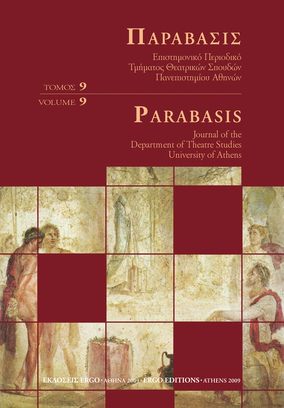Μεθοδολογικοί προβληματισμοί και ιστορικές πηγές για το ελληνικό θέατρο του 18ου και 19ου αιώνα : Προοπτικές και διαστάσεις, περιπτώσεις και παραδείγματα
Part of : Παράβασις : επιστημονικό περιοδικό Τμήματος Θεατρικών Σπουδών Πανεπιστημίου Αθηνών ; Vol.1, No.1, 1995, pages 11-112
Issue:
Pages:
11-112
Parallel Title:
Methodological problems and historical sources o f the Greek theatre in the 18th and 19th century. : Prospectives and dimensions, cases and examples.
Author:
Abstract:
The study deals with the forms o f transformation of dramatical and theatrical conventions from 1750 to 1850, from the dramaturgy of Baroque and Enlightenment to the national drama of Classicism and Romanticism in the new founded Greek state. This dynamic of change is not unlinear and follows different ways and modes. Twelve subchapters are dealing systematically with different thematic unities, highlighting the complexity of the transformation process, which Greek theatre and dramaturgy is going through this period. Drama is changing its content from religious themes to didactic scores and to national goals; dramaturgy is changing its paradigmas from the Baroque tragedy of the Christian martyrs to classicistical forms of national drama. The titles of the subchapters are the following: 1 ) ≪The multiple transgression from Baroque to Enlightenment≫, analyzing the religious dramaturgy of the Cyclades and Chios up to 1750 as well as the Heptanesian theatre tradition up to 1800 and comparing it with the didactic and satiric dramaturgy of Phanariotic origin; 2) ≪Forms o f theatrical expression in the 18th century': declamation and dialogue≫, giving emphasis to the dialogic and dramatic element in the ≪Mirror o f women≫ of Kaisarios Dapontes (1766) and giving evidence to a declamation of pupils in a Catholic church of Chios between 1740 and 1744; 3) ≪Italian theatreproduction of Greeks in the 18th century≫ collecting informations on Greek drama writers and librettists in Venice; 4) ≪Lost works and unknown models in the Greek theatre of the 18th century≫ mainly on the enigmatic informations about the dramatic translations of Georgios Sakellariou in Vienna (there is evidence that he translated in Greek the French libretto Orphee et Euridice of Christoph Willibald Gluck; 5) ≪The beginning of the Greek pantomime≫; 6) ≪Theatre performances in Greece under the Ottoman rule≫; 7) ≪A Greek performance of the Halosis o f Constantinople in Constantinople 1821 ; giving evidence to a remarkable event, which takes place a few months before the outbreak of the Greek Revolution: the performance was cut down by the Turks and the owner of the room, which was hired on purpose, was beheaded; 8) ≪New informations of the theatrical tradition of the Ionian Islands≫, giving mainly emphasis to the Commedia dell' Arte troupe, which mentions Casanova in his Memoires; 9) ≪The manuscripts of Chassis≫, to which refers Nikolaos Dragoumis in his Historical Memoirs ( 1874); 10) ≪An inexistent drama of Georgios Lassanis≫, mentioned by Harro Paul Harring (Der Renegat aus Morea), which is finally his own work; 11) ≪The beginnings of theatre performances in Athens after the Revolution≫ adding several unknown performances of acrobats to the performances of the dilettanti in 1836/37; 12) ≪Information sources of theatre performances: travel books, memoirs, newspapers, letters, romances≫, analyzing the different categories of sources about Greek theatre history in the 19th century and giving special emphasis to the iformations in the Aufzeichnungen eines Junker am Hof zu Athen of j.Bor.Ow (1854) and the Briefe einer Hofdame in Athen an eine Freundin in Deutschland of J . von Nordenflycht ( 1845). Briefe einer Hofdame in Athen an eine Freundin in Deutschland of J . von Nordenflycht ( 1845).
Subject:
Subject (LC):




